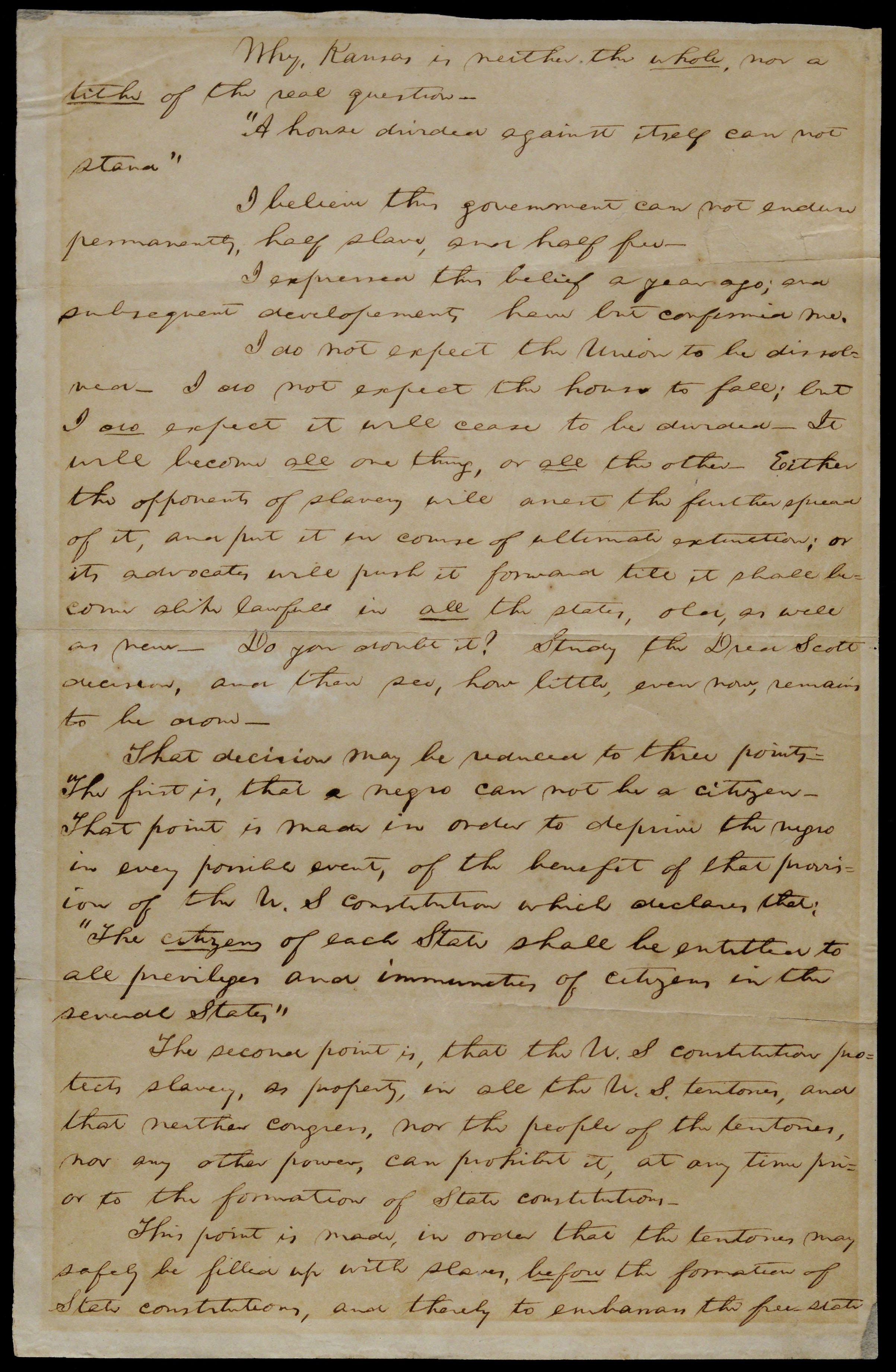The "House Divided" Speech, ca. 1857–1858
A Spotlight on a Primary Source by Abraham Lincoln
By 1850, the extension of slavery into the new territories won through the Mexican-American War of 1846–1848 provided a testing ground for competing visions of America. The passage of the Fugitive Slave Law in 1850 and the Kansas-Nebraska Act in 1854 precipitated a firestorm in Kansas.
The Dred Scott decision in 1857 affirmed that no slave or descendant of a slave could ever be a US citizen. It ignited jubilation in the South and fierce protests in the North, and marked the end of compromise between the opposing groups. The decision strengthened the bonds among abolitionists, Republicans, and moderates in the North.
 These events moved Lincoln to take a public stand against the extension of slavery. In this speech fragment from 1857, which he later expanded as the opening speech of the 1858 US Senate campaign against Stephen A. Douglas, Abraham Lincoln identified slavery as a moral and a political issue that threatened the continued existence of the United States. Invoking the famous biblical words, "A house divided against itself can not stand," he declared, "I do not expect the Union to be dissolved. I do not expect the house to fall; but I do expect it will cease to be divided. It will become all one thing, or all the other. Either the opponents of slavery will arrest the further spread of it, and put it in course of ultimate extinction; or its advocates will push it forward till it shall become alike lawfull in all the states, old, as well as new." Lincoln’s formulation was viewed by some as radical and provocative. However, in this speech Lincoln appealed to a growing sense in the North that national politics under successive Democratic administrations (aided by a southward leaning Supreme Court) were being driven by a slave interest, which many northerners were increasingly ready to call the Slave Power.
These events moved Lincoln to take a public stand against the extension of slavery. In this speech fragment from 1857, which he later expanded as the opening speech of the 1858 US Senate campaign against Stephen A. Douglas, Abraham Lincoln identified slavery as a moral and a political issue that threatened the continued existence of the United States. Invoking the famous biblical words, "A house divided against itself can not stand," he declared, "I do not expect the Union to be dissolved. I do not expect the house to fall; but I do expect it will cease to be divided. It will become all one thing, or all the other. Either the opponents of slavery will arrest the further spread of it, and put it in course of ultimate extinction; or its advocates will push it forward till it shall become alike lawfull in all the states, old, as well as new." Lincoln’s formulation was viewed by some as radical and provocative. However, in this speech Lincoln appealed to a growing sense in the North that national politics under successive Democratic administrations (aided by a southward leaning Supreme Court) were being driven by a slave interest, which many northerners were increasingly ready to call the Slave Power.
Transcript
Why, Kansas is neither the whole, nor a tithe of the real question.
"A house divided against itself can not stand"
I believe this government can not endure permanently, half slave, and half free.
I expressed this belief a year ago; and subsequent developments have but confirmed me.
I do not expect the Union to be dissolved. I do not expect the house to fall; but I do expect it will cease to be divided. It will become all one thing, or all the other. Either the opponents of slavery will arrest the further spread of it, and put it in course of ultimate extinction; or its advocates will push it forward till it shall become alike lawfull in all the states, old, as well as new. Do you doubt it? Study the Dred Scott decision, and then see, how little, even now, remains to be done.
That decision may be reduced to three points. The first is, that a negro can not be a citizen. That point is made in order to deprive the negro in every possible event, of the benefit of that provision of the U. S Constitution which declares that: "The citizens of each State shall be entitled to all previleges and immunities of citizens in the several States."
The second point is, that the U. S constitution protects slavery, as property, in all the U. S. territories, and that neither congress, nor the people of the territories, nor any other power, can prohibit it, at any time prior to the formation of State constitutions.
This point is made, in order that the territories may safely be filled up with slaves, before the formation of State constitutions, and thereby to embarrass the free states[.]
A full transcript is available.
